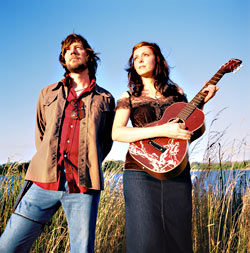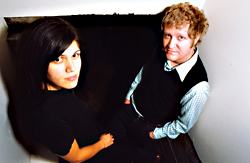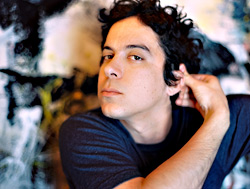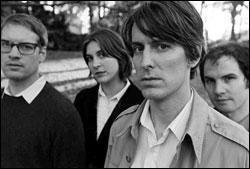Tucked away in the foothills of the Sierra Nevada mountain range, deep in the heart of California gold country, is the town of Nevada City: population 3,001.
Equidistant from Reno and Sacramento, Nevada City is a place with considerable period charm, a former mining community that’s gone boom and bust over the years and now features a suitably festooned main street and hosts an annual bicycling event and the Sierra Storytelling Festival. Country-rock group the Jayhawks even wrote a song about the place.
For reasons not entirely explainable to nonresidents, the town’s smallish, inwardly focused environs have also produced more than their fair share of musical talent—so-called neo-hippie wunderkind Joanna Newsom, avant-garde minimalist Terry Riley, and composer Harry Hersh have called Nevada City “home,” with Newsom candidly assessing it as a place “swarming with artists, hippies, and old prospectors.”
Until 2005, the tiny burg also served as home base for Alela Diane Menig, a folk artist of staggering intensity and promise whose debut release, The Pirate’s Gospel, has quietly garnered attention in all the right influential places since it was self-released in 2004. (It was recently formally reissued, with a slightly different track listing than its original incarnation.)
“I’d been living in San Francisco for a couple of years, and then I moved back,” Menig begins, picking her words carefully. “I quickly realized it would be impossible to pursue my music if I lived there. I knew I had to be in a city in order to do music; I didn’t want to live in San Francisco again, and L.A. was out. So Portland seemed like the next best option,” she giggles.
Menig comes by her musical gifts honestly enough. Her parents were musicians, and the sound of their singing was often the first thing that greeted her in the mornings as she was growing up. “They were always playing music around the house,” she remembers. “Pretty much every morning, my parents would sing together in the kitchen. When I was really young, they’d do traditional bluegrass songs together; they both played in a number of bands around town, hit the local folk festivals. Later on, that phased out, and my dad started a Grateful Dead cover band called the Deadbeats. He’s still in it; it’s been 12 years!” she laughs. “I never had to buy a Grateful Dead CD because of them.”
Menig’s father also has his own recording studio and produced her first album, a situation that—she says with hindsight—has both its advantages and its drawbacks. “In high school, I was in choir, and my parents were always after me to pick up the guitar, but I never focused on it. I thought it was kind of dorky. It wasn’t until I moved away from home that things started happening for me musically. Then I moved back, and I think my dad was pretty excited to see me do my own thing with music because I hadn’t for so long, I’m sure he thought I was never going to. So recording with him was fun but also frustrating, because he loved everything I did,” she explains. “He wasn’t going to say, ‘I think you can probably do that one better if you do it again.’ He’d be like, ‘Hey, that was great!’ and was satisfied with a bunch of first takes. It was sweet of him.”
For a record consisting of what amounts to a run through her summer 2004 set list, Menig’s debut is a wildly accomplished monument to the power of simplicity and her considerable vocal gifts. The Pirate’s Gospel showcases her knack for powerfully crafted melodies and features a vocal twang not unlike Jolie Holland or even Bessie Smith: mature and lived in, with a catch at the high end that literally takes your breath away. (The album’s “Tired Feet” and “Clickety Clack” capture Menig at her best, both in terms of composition and performance, while new tunes such as “My Brambles” are featured on her MySpace site and point toward her considerable future potential.) It’s a languid, unstudied paean to old American folk styles that neatly pulls off the balancing act of being entirely contemporary while paying subtle tribute to America’s musical past.
Still, there seems to be a contingent that can’t let go of her connection to Newsom, despite the obvious dissimilarities. “People seem to have grabbed onto the fact that Joanna’s from the same small town I am, and in many ways, we’ve gotten inspiration from the same types of things. But we’ve also had really different musical upbringings. Hers is way more classical than mine; she’s more formally trained, and it makes a big difference. It’s not necessarily the most important comparison, I think.”








